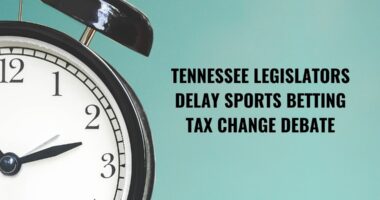Tennessee Legislators Might Take Up Sports Betting Tax Changes Later

State legislators might address proposed changes to the tax structure on Tennessee sports betting revenue if they have time. Considering the tenets of the bills, it might be best if the Tennessee legislature never gets around to them.
The legislation gives Tennessee online gambling companies something they want but does it in a way that might make the situation worse. Should the principles of the bills someday become law, they would keep Tennessee unique among states with legal sportsbooks.
Tennessee sports betting changes put behind the budget
On Wednesday, the Tennessee House of Representatives placed HB1362 “behind the budget.” Its Senate companion, SB0475, is still on the calendar for that body’s Finance, Ways, and Means Committee for March 28.
However, even if the Senate should approve SB0475, the House likely won’t consider it or HB1362 immediately. In Tennessee, placing a bill behind the budget means that it won’t get consideration until
the legislature finalizes the budget for the upcoming fiscal year.
In previous years, that task ran through early April. Although there is no finite adjournment date, sessions normally end in the middle of April each year. For that reason, the legislature might have just a few days to consider all bills that were placed behind the budget.
Whether HB1362 and SB0475 will take priority in that group is uncertain. Sportsbook operators might prefer it fall through the cracks.
How the bills would change the tax structure
Right now, Tennessee levies a 20% privilege tax on licensed sportsbooks’ revenue, after certain adjustments. The law also requires sportsbooks to hold at least 10% of the money they accept in bets each month. However, enforcement of that last requirement has been lax.
Tennessee is the only state with such a requirement. Sportsbook operators have criticized the mandate before it became part of the state’s regulations and have continued to do so since. They have argued that complying with the requirement would require them to cut back on promotions or offer less competitive odds to make up the difference.
At adoption, regulators said the requirement would guarantee revenue for the state.
These bills attempt to reach a similar destination by another route. They repeal the hold requirement and the 20% privilege tax. At the same time, they would levy a new privilege tax on the money sportsbooks take in from bettors, also known as handle.
Some simple math shows that this proposal could represent a compromise of sorts between competing interests.
Tennessee wouldn’t necessarily make more money
HB1362 would levy a 1.85% tax on handle. SB0475 suggests a 2% rate. Using Tennessee sports betting numbers from January, it’s possible to take a simplistic look at the proposal’s effects.
That month, Tennessee sportsbooks handled around $410.8 million. Their adjusted revenues came to about $36.3 million. That’s less than a 10% hold. As a result, the state collected just over $7.2 million in taxes during the month.
If the hold requirement was being enforced, the state would have collected about a million more dollars than it did. A 10% hold on January’s handle would be $41 million, leading to $8.2 million in tax revenue at a 20% rate.
This is what the tax would have come to under the proposed changes:
- 1.85% of handle – $7.6 million
- 2% of handle – $8.2 million
That’s without any adjustments, however, like promotional deductions. If such adjustments would continue to be allowed to some extent, those amounts would drop. Even though a tax on handle could represent less of a tax liability for sportsbooks, this change wouldn’t necessarily benefit them.
Sportsbooks getting taxed on money they don’t have
One way to think about handle vs. revenue is to compare a sportsbook to a traditional bank. When you deposit your money into a bank, it doesn’t just sit there until you want it. The bank gives it to other people in exchange for interest and pays you some of that interest.
Similarly, when you deposit your money into your online sports betting account, the sportsbook uses your money to pay out other people’s winnings, or your own. The only way the sportsbook keeps any of that money is by people losing their bets, making banking a superior business model.
There’s no guarantee that at the end of each month, however, the sportsbook will not have paid out more money than it took in. That’s why no state has yet imposed a tax on handle, preferring to tax revenue instead. It would be like if you had to pay income tax on money that you merely delivered for a third party.
If bettors in Tennessee have a good month, under the proposed format, Tennessee sportsbooks could run a significant loss by having to pay tax on handle on top of payouts to bettors. In turn, that could incentivize them to make changes to avoid such losses.
In the end, that could hurt not only the product but bettors as well. If these proposals never see the light of day in Nashville again, that might not be the worst thing that could happen.








